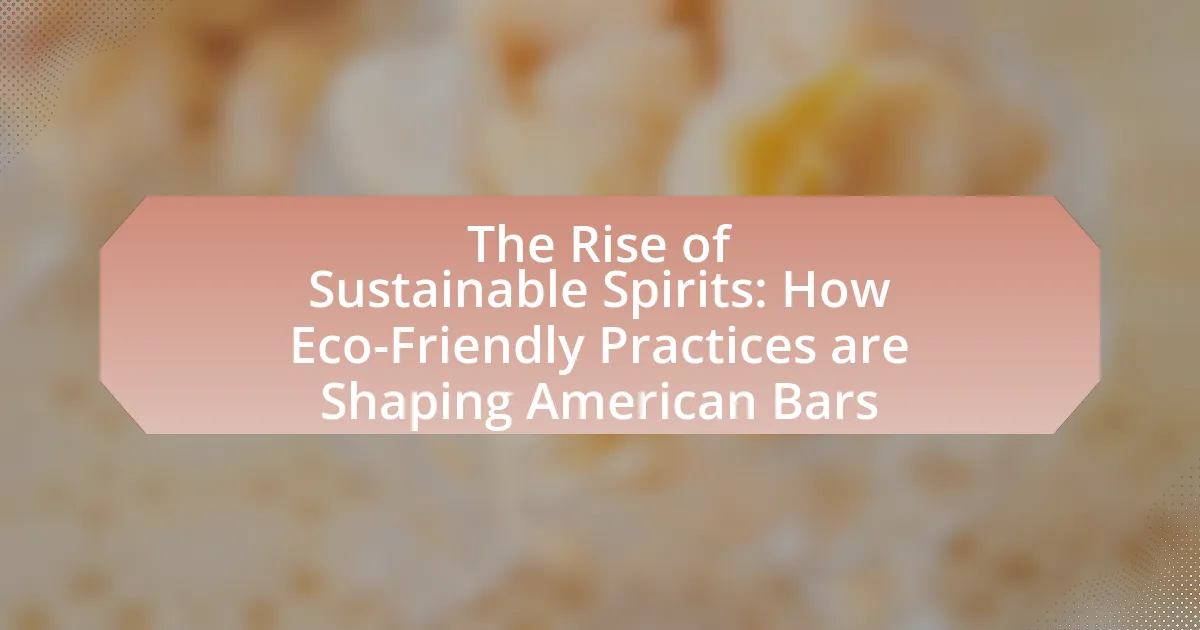Sustainable spirits are alcoholic beverages produced through environmentally friendly practices that aim to minimize ecological impact. This article explores the significance of sustainable spirits in reducing carbon footprints, promoting biodiversity, and supporting local economies, highlighting their differences from traditional spirits in production methods. It discusses the practices that define sustainable spirits, the environmental benefits they offer, and the challenges bars face in sourcing and implementing these eco-friendly options. Additionally, it examines how American bars are adapting to the rise of sustainable spirits, emerging trends in bar menus, and strategies for educating consumers about sustainability, ultimately outlining the future of sustainable practices in the beverage industry.

What are Sustainable Spirits and Why are They Important?
Sustainable spirits are alcoholic beverages produced using environmentally friendly practices that minimize ecological impact. These practices include sourcing ingredients from local, organic farms, utilizing renewable energy in production, and implementing water conservation measures. The importance of sustainable spirits lies in their contribution to reducing carbon footprints, promoting biodiversity, and supporting local economies. For instance, a report by the Distilled Spirits Council of the United States highlights that sustainable practices can lead to a 30% reduction in greenhouse gas emissions in the production process. This shift not only addresses environmental concerns but also aligns with consumer demand for responsible and ethical products, making sustainable spirits a vital part of the evolving beverage industry.
How do Sustainable Spirits differ from Traditional Spirits?
Sustainable spirits differ from traditional spirits primarily in their production methods, which prioritize environmental responsibility and resource conservation. Sustainable spirits utilize organic ingredients, renewable energy sources, and eco-friendly packaging, reducing their carbon footprint and minimizing waste. For instance, many sustainable distilleries implement practices such as water conservation and sourcing local ingredients to support local economies, which contrasts with traditional spirits that may rely on conventional agricultural practices and non-renewable resources. This commitment to sustainability is evidenced by the growing number of certifications, such as organic or carbon-neutral labels, that many sustainable spirits now carry, highlighting their adherence to environmentally friendly practices.
What practices define Sustainable Spirits?
Sustainable spirits are defined by practices that prioritize environmental responsibility and resource conservation throughout their production processes. These practices include sourcing ingredients locally to reduce carbon footprints, utilizing organic farming methods to avoid harmful pesticides, and implementing water conservation techniques during distillation. Additionally, sustainable spirits often involve using renewable energy sources in production facilities and adopting eco-friendly packaging to minimize waste. For instance, according to the Distilled Spirits Council, many distilleries are now focusing on zero-waste initiatives, which significantly reduce their environmental impact.
Why is the production process significant for sustainability?
The production process is significant for sustainability because it directly influences resource efficiency and environmental impact. Sustainable production methods minimize waste, reduce energy consumption, and utilize renewable resources, which collectively contribute to lower carbon emissions. For instance, a study by the World Economic Forum indicates that adopting sustainable practices in production can reduce greenhouse gas emissions by up to 70%. This demonstrates that the way products are made is crucial for achieving sustainability goals and mitigating climate change effects.
What impact do Sustainable Spirits have on the environment?
Sustainable spirits positively impact the environment by reducing carbon footprints and promoting responsible sourcing of ingredients. These eco-friendly practices often involve using organic farming methods, which minimize pesticide use and enhance biodiversity. For instance, distilleries that prioritize local sourcing decrease transportation emissions, while many sustainable brands implement water conservation techniques, reducing overall water usage by up to 50%. Additionally, sustainable spirits often utilize renewable energy sources in production, further lowering greenhouse gas emissions. This combination of practices contributes to a more sustainable beverage industry, aligning with broader environmental goals.
How do Sustainable Spirits reduce carbon footprints?
Sustainable spirits reduce carbon footprints by utilizing eco-friendly production methods and sourcing ingredients locally. These practices minimize transportation emissions and energy consumption during production. For instance, distilleries that use renewable energy sources, such as solar or wind power, significantly lower their greenhouse gas emissions. Additionally, sustainable spirits often incorporate organic farming practices, which enhance soil health and reduce the need for chemical fertilizers, further decreasing environmental impact. Studies indicate that local sourcing can cut transportation-related emissions by up to 50%, demonstrating the effectiveness of these sustainable practices in reducing overall carbon footprints.
What role do local ingredients play in sustainability?
Local ingredients significantly enhance sustainability by reducing transportation emissions and supporting local economies. When bars and restaurants source ingredients from nearby farms, they minimize the carbon footprint associated with long-distance shipping, which contributes to lower greenhouse gas emissions. Additionally, utilizing local produce fosters community resilience and strengthens local agricultural systems, as evidenced by a study from the University of California, which found that local sourcing can reduce food miles by up to 90%. This practice not only promotes environmental sustainability but also encourages the preservation of regional biodiversity and traditional farming methods.
How are American Bars adapting to the rise of Sustainable Spirits?
American bars are adapting to the rise of sustainable spirits by incorporating eco-friendly practices into their operations and menu offerings. Many establishments are sourcing spirits from brands that prioritize sustainable production methods, such as organic farming and responsible sourcing of ingredients. For instance, bars are increasingly featuring local distilleries that utilize renewable energy and sustainable agricultural practices, which reduces their carbon footprint and supports local economies. Additionally, bartenders are creating cocktails that highlight these sustainable spirits, promoting awareness among consumers about the environmental impact of their choices. This shift is evidenced by a growing trend in the industry, where a survey by the Distilled Spirits Council reported that 60% of bars are now offering at least one sustainable spirit option on their menu.
What trends are emerging in bar menus regarding Sustainable Spirits?
Emerging trends in bar menus regarding sustainable spirits include the increased use of organic and locally sourced ingredients, as well as a focus on low-waste practices. Bars are prioritizing spirits made from organic grains and botanicals, which reduces chemical usage and supports local agriculture. Additionally, many establishments are adopting low-waste initiatives, such as utilizing by-products from spirit production in cocktails or repurposing leftover ingredients. This shift is supported by consumer demand for environmentally friendly options, with a 2022 survey indicating that 66% of consumers are willing to pay more for sustainable products.
How are bartenders educated about Sustainable Spirits?
Bartenders are educated about Sustainable Spirits through specialized training programs, workshops, and industry certifications focused on eco-friendly practices. These educational initiatives often include information on sourcing sustainable ingredients, understanding the environmental impact of spirits production, and promoting responsible consumption. For instance, organizations like the United States Bartenders’ Guild offer courses that cover sustainable practices in the bar industry, emphasizing the importance of reducing waste and supporting local producers. Additionally, many distilleries provide resources and training to bartenders about their sustainable practices, ensuring that bartenders can effectively communicate these values to customers.

What are the Challenges of Implementing Eco-Friendly Practices in Bars?
The challenges of implementing eco-friendly practices in bars include high initial costs, limited availability of sustainable products, and resistance from both staff and customers. High initial costs can deter bar owners from investing in eco-friendly equipment or sourcing sustainable ingredients, as they may perceive these expenses as a financial burden. Limited availability of sustainable products, such as organic spirits or biodegradable materials, can complicate procurement processes, making it difficult for bars to fully commit to eco-friendly practices. Additionally, resistance from staff, who may be accustomed to traditional methods, and customers, who may prioritize convenience over sustainability, can hinder the adoption of these practices. According to a survey by the National Restaurant Association, 66% of consumers are willing to pay more for sustainable products, indicating a potential market for eco-friendly bars, but the challenges remain significant.
What barriers do bars face when sourcing Sustainable Spirits?
Bars face several barriers when sourcing sustainable spirits, primarily including limited availability, higher costs, and lack of consumer awareness. The limited availability of sustainable spirits arises from the smaller production scale of eco-friendly brands compared to traditional spirits, making it challenging for bars to find a consistent supply. Higher costs are often associated with sustainable production methods, which can deter bars from incorporating these products into their offerings, as they may prioritize profit margins. Additionally, a lack of consumer awareness about sustainable spirits can hinder demand, leading bars to hesitate in investing in these products due to uncertainty about their popularity. These barriers collectively impact the ability of bars to effectively source and promote sustainable spirits.
How does cost affect the adoption of Sustainable Spirits?
Cost significantly impacts the adoption of Sustainable Spirits by influencing consumer purchasing decisions and the willingness of bars to stock these products. Higher production costs associated with sustainable practices often lead to elevated retail prices, which can deter price-sensitive consumers. For instance, a study by the Beverage Marketing Corporation found that 60% of consumers are willing to pay more for sustainable products, but only if the price difference is within a reasonable range. Additionally, bars may hesitate to adopt sustainable spirits if the cost exceeds their budget constraints, limiting their ability to offer eco-friendly options. Thus, while there is a growing demand for sustainable spirits, the cost remains a critical barrier to widespread adoption.
What logistical issues arise in maintaining sustainability?
Logistical issues in maintaining sustainability include supply chain disruptions, resource allocation challenges, and waste management difficulties. Supply chain disruptions can occur due to the reliance on local and sustainable sourcing, which may limit availability and increase costs. Resource allocation challenges arise when balancing eco-friendly practices with operational efficiency, often leading to conflicts between sustainability goals and profitability. Waste management difficulties stem from the need to implement effective recycling and composting systems, which can be complex and costly to establish. These issues highlight the intricate balance required to achieve sustainability in the bar industry while maintaining operational viability.
How can bars overcome these challenges?
Bars can overcome challenges related to sustainability by implementing eco-friendly practices such as sourcing local ingredients, reducing waste, and utilizing energy-efficient equipment. For instance, sourcing local spirits and mixers minimizes transportation emissions and supports local economies. Additionally, bars can adopt waste reduction strategies, such as composting organic waste and recycling materials, which can lead to a reduction in overall waste by up to 50%, as reported by the National Restaurant Association. Furthermore, investing in energy-efficient appliances can lower energy consumption by 20-30%, contributing to both cost savings and environmental benefits.
What strategies can bars employ to educate consumers about sustainability?
Bars can employ several strategies to educate consumers about sustainability, including hosting workshops, utilizing informative signage, and collaborating with local sustainability organizations. Workshops can provide hands-on experiences where consumers learn about sustainable practices, such as sourcing local ingredients or reducing waste. Informative signage throughout the bar can highlight eco-friendly initiatives, such as the use of biodegradable straws or recycling programs, making sustainability visible and engaging. Collaborating with local sustainability organizations can enhance credibility and provide expert knowledge, allowing bars to offer events or talks that deepen consumer understanding of sustainability issues. These strategies not only inform consumers but also foster a community around sustainable practices in the hospitality industry.
How can partnerships with local distilleries enhance sustainability efforts?
Partnerships with local distilleries can enhance sustainability efforts by promoting the use of locally sourced ingredients, which reduces transportation emissions and supports regional agriculture. By collaborating with these distilleries, bars can create a supply chain that prioritizes environmental responsibility, as local distilleries often implement eco-friendly practices such as water conservation and waste reduction. For instance, a study by the American Distilling Institute found that local distilleries are more likely to engage in sustainable practices compared to larger, industrial producers, thereby contributing to a lower carbon footprint in the beverage industry.

What Future Trends Can We Expect in Sustainable Spirits and Bars?
Future trends in sustainable spirits and bars include increased use of locally sourced ingredients, innovative eco-friendly packaging, and a focus on waste reduction practices. Bars are likely to prioritize sustainability by sourcing spirits from local distilleries, which reduces carbon footprints and supports local economies. Additionally, the adoption of biodegradable or reusable packaging will become more prevalent as consumers demand environmentally responsible options. Waste reduction practices, such as composting organic materials and minimizing single-use plastics, will also be integral to the operations of sustainable bars. According to a 2022 report by the Beverage Marketing Corporation, 70% of consumers are more likely to choose brands that demonstrate sustainability efforts, indicating a strong market shift towards eco-friendly practices in the spirits industry.
How will consumer preferences shape the future of Sustainable Spirits?
Consumer preferences will significantly shape the future of sustainable spirits by driving demand for eco-friendly production methods and transparency in sourcing. As consumers increasingly prioritize sustainability, brands that adopt environmentally responsible practices, such as using organic ingredients and reducing carbon footprints, will likely gain a competitive edge. A survey by Nielsen found that 73% of millennials are willing to pay more for sustainable products, indicating a strong market trend towards eco-conscious consumption. This shift in consumer behavior will compel distilleries to innovate and implement sustainable practices to meet the evolving expectations of their customer base.
What innovations are being developed in the sustainable spirits industry?
Innovations in the sustainable spirits industry include the development of eco-friendly distillation processes, the use of organic and locally sourced ingredients, and the implementation of circular economy practices. For instance, some distilleries are adopting renewable energy sources, such as solar and wind power, to reduce their carbon footprint during production. Additionally, brands are increasingly utilizing waste materials from other industries, like spent grains from breweries, to create new spirits, thereby minimizing waste. Research indicates that the global market for sustainable spirits is projected to grow significantly, reflecting a rising consumer demand for environmentally responsible products.
How might regulations influence the growth of Sustainable Spirits?
Regulations can significantly influence the growth of Sustainable Spirits by establishing standards that promote environmentally friendly practices within the industry. For instance, regulations that incentivize the use of organic ingredients or mandate sustainable sourcing can encourage distilleries to adopt eco-friendly methods. A study by the Distilled Spirits Council of the United States indicates that compliance with environmental regulations can lead to increased consumer trust and brand loyalty, ultimately driving sales. Furthermore, regulations that limit carbon emissions and waste can push producers to innovate and invest in sustainable technologies, thereby enhancing their market competitiveness.
What practical steps can bars take to embrace sustainability today?
Bars can embrace sustainability today by implementing practices such as sourcing local and organic ingredients, reducing waste through recycling and composting, and utilizing energy-efficient appliances. Sourcing local ingredients minimizes transportation emissions and supports local economies, while organic ingredients reduce the use of harmful pesticides. According to the National Restaurant Association, 60% of consumers are more likely to choose a restaurant that offers locally sourced food. Additionally, bars can reduce waste by implementing recycling programs and composting organic materials, which can divert up to 30% of waste from landfills. Finally, using energy-efficient appliances can lower energy consumption, with the U.S. Department of Energy noting that energy-efficient equipment can save businesses up to 30% on energy costs.
How can bars effectively market their sustainable practices to attract customers?
Bars can effectively market their sustainable practices by highlighting their eco-friendly initiatives through targeted marketing strategies. For instance, they can utilize social media platforms to showcase their sustainable sourcing of ingredients, such as local and organic produce, which resonates with environmentally conscious consumers. Research indicates that 66% of global consumers are willing to pay more for sustainable brands, demonstrating a strong market demand for eco-friendly practices. Additionally, bars can implement loyalty programs that reward customers for choosing sustainable options, further incentivizing eco-conscious behavior. By transparently communicating their sustainability efforts, such as waste reduction and energy-efficient operations, bars can build trust and attract a customer base that values environmental responsibility.
What are some best practices for integrating Sustainable Spirits into a bar’s offerings?
To effectively integrate Sustainable Spirits into a bar’s offerings, bars should prioritize sourcing from local distilleries that utilize organic ingredients and sustainable production methods. This practice not only supports local economies but also reduces carbon footprints associated with transportation. Additionally, bars can create a dedicated menu section highlighting these sustainable options, educating customers on the environmental benefits of their choices. Implementing waste reduction strategies, such as using by-products from spirits in cocktails or food pairings, further enhances sustainability efforts. Research indicates that consumers are increasingly seeking eco-friendly options, with a 2021 survey by Nielsen showing that 73% of millennials are willing to pay more for sustainable products.

